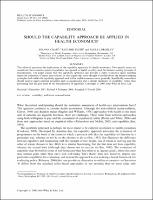| dc.contributor.author | Coast, Joanna | |
| dc.contributor.author | Smith, Richard | |
| dc.contributor.author | Lorgelly, Paula | |
| dc.date.accessioned | 2022-05-08T08:25:36Z | |
| dc.date.available | 2022-05-08T08:25:36Z | |
| dc.date.issued | 2008-06 | |
| dc.identifier.issn | 10579230, 10991050 | |
| dc.identifier.uri | https://resources.equityinitiative.org/handle/ei/428 | |
| dc.description.abstract | This editorial questions the implications of the capability approach for health economics. Two specific issues are considered: the evaluative space of capablities (as opposed to health or utility) and the decision-making principle of maximisation. The paper argues that the capability approach can provide a richer evaluative space enabling improved evaluation of many interventions. It also argues that more thought is needed about the decision-making principles both within the capability approach and within health economics more generally. Specifically, researchers should analyse equity-oriented principles such as equalisation and a ‘decent minimum’ of capability, rather than presuming that the goal must be the maximisation of capability. Copyright r 2008 John Wiley & Sons, Ltd. | |
| dc.format.extent | 667-670 p. | |
| dc.format.mimetype | application/pdf | |
| dc.language.iso | en | |
| dc.publisher | Health Economics | |
| dc.rights | © 2008 John Wiley & Sons, Ltd. | |
| dc.subject | capability | |
| dc.subject | welfarism | |
| dc.subject | non-welfarism | |
| dc.title | Should the capability approach be applied in Health Economics? | |
| dc.type | journalArticle | |
| dc.identifier.doi | 10.1002/hec.1359 | |

